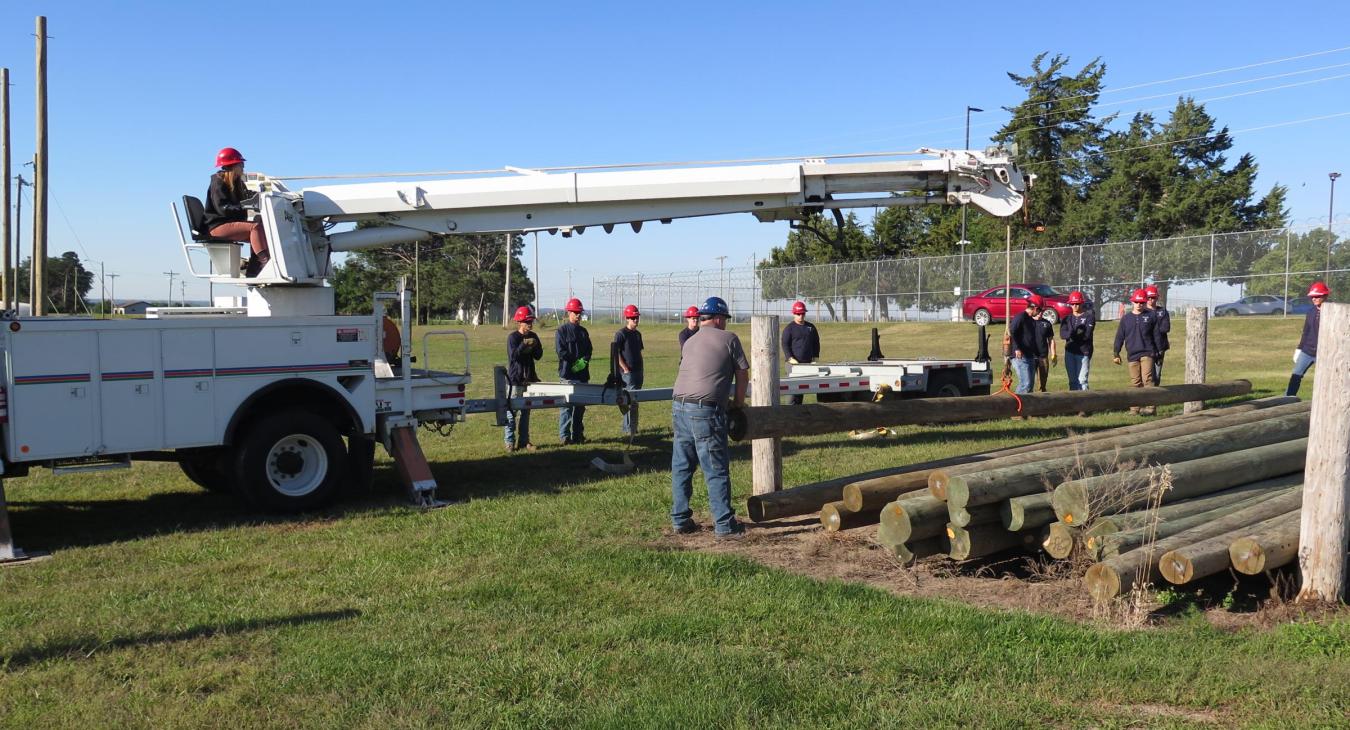By LaRayne Topp
“If they come to class with a worn-out pliers-holder on their belt, you know they’ll be a good student.” That’s the feeling of Todd Pfeil, utility line instructor at Northeast Community College in Norfolk, Nebraska. Student Brittany Grammer may not have come with a pliers-holder on her blue jeans, but Pfeil says, “She’s not shy.” That may be because she has to hold her own with her fellow lineworker students as one of the few females the utility line program has seen.
With a one and a half to two-hour drive from home to school, four days out of a week, Grammer has shown herself to be a dedicated student. Then add to that, four kids (ages 17, 13, 7 and 6) and a husband, Mike Couchenour, at her home in Cedar Rapids, Nebraska, and you’ll know how determined she actually is to get her utility line degree.
Before enrolling at Northeast, Grammer took up automotive repair in high school. Later she studied nursing and served as a nurse’s aide in both a hospital’s emergency room and its intensive care unit. Then she became certified in drafting, working for a company that replaced underground electrical cables. She became familiar with industry standards and calling for materials, plus designing and fixing underground. It’s at that point that Grammer fell in love with electricity.
She also liked Northeast from first glance, appreciating its nationally-recognized and comprehensive utility line and job training safety program. College information states that completion of the program prepares its students for skilled and highly-marketable careers installing, replacing, and repairing electrical power poles, lines and equipment.
“I like electricity a lot,” Grammer explained. Her previous drafting work had given her basic understanding of the electrical grid, but it was the climbing and assembly that she wasn’t familiar with, she said.
The transition from her job behind a computer screen to climbing up on the poles seemed like a good fit for Grammer as she enjoys the outdoors (she felt like a potato sitting at the computer), and isn’t afraid of heights.
Todd Pfeil, who has been an instructor for Northeast’s utility line program for the past five years and was a lineman himself for 15, recalled one student who fearfully made it to the top of the pole and immediately climbed back down.
“We never saw him again,” Pfeil said.
“You can’t be afraid of heights,” Grammer agreed, understanding that students, and eventually full-fledged lineworkers, rely on the supports around the belt and pole to keep them safe from falling. Once students adjourned from the classroom to the field, and eventually up on the pools, Grammer enjoyed time spent throwing softballs around from the top of one pole to the top of another with her fellow students, even calling it “fun.”
Her fellow students—completing training to climb poles, utilize heavy equipment to move poles onto and off of a truck and place them in the ground, plus install, operate, and maintain electrical utility lines—are all young men.
“I appreciate that they don’t cut me any slack or baby me,” she said. “I’m just like one of them.”
Some day, in a decade or two, when Lineworker Grammer becomes tired of climbing those poles and is anticipating a slower paced job, she hopes to add project manager or journeyman to her name.
For the moment, she looks forward to completing company interviews to secure an apprenticeship to earn on-the-job training, one of the degree requirements at Northeast. Following graduation, it’s onto the job site whether it’s at a rural power district or city municipal, or specialized areas such as underground, high voltage substations, load control and load management, street lighting, traffic control or metering.
For Grammer, the harder it is, the better. “I want storm duty in an emergency situation,” she said, “where I can jump on it, fix it and get it done!”
Type A personality students, such as Grammer, are no surprise to Todd Pfeil. They are regulars in his classroom and are go-getters.
“It’s hard for them to ever say, ‘I can’t do this,’ Pfeil said, because they have a lot of pride.
Because Northeast Community College offers one of only three two-year utility line degree programs in the United States, plus the only two-year utility line program in Nebraska, the college has a waiting list to get in. Junior and Senior high school students from the area and out of state tour the school; once accepted, they come from across the country.
“Indiana, New York, and Pennsylvania are almost always represented,” Pfeil said.
Northeast utility line program students not only study the topics of wiring, pole climbing, metering and line construction, but they actually perform these skills as they learn. Instruction also includes practical application of mathematics, sciences, circuit diagrams and blueprints, together with pole-line construction.
These aren’t skills typically used elsewhere, in any other career, Pfeil said. It’s not until students get outside the classroom that they are able to actually utilize what they’ve learned in the lab.
“I get a lot of wide eyes.” Pfeil said. “It’s all a foreign concept and then the light goes on.”
After all, it’s electricity.

